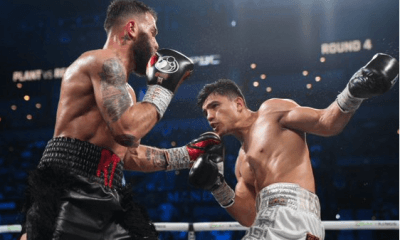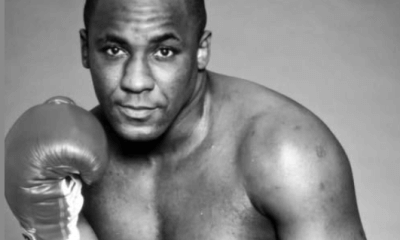Articles of 2007
When to retire: Now or never?
After beating Archie Moore, Rocky Marciano walked out of the Yankee Stadium ring into retirement and boxing legend as the only heavyweight champion never to have lost a fight.
Other boxing greats such as James J. Jeffries, Jack Dempsey, Barney Ross and John Henry Lewis finished their careers with losses in bouts that became ingrained in boxing lore, but the final fights for a lot of top fighters, including Joe Louis, Muhammad Ali and Joe Frazier, were only sad, often embarrassing.
Are Oscar De La Hoya and Bernard Hopkins headed for career-enhancing, or embarrassing, exits?
Marciano, whose ninth-round knockout of Moore on Sept. 21, 1955, before 61,575 fans made his record 49-0, announced in his retirement on April 28, 1956. The reasons given were wanting to spend more time with his family, a cranky back, lack of top-flight opponents, manager Al Weill’s tiresome ego and distrust of Weill in financial matters.
“But one thing remains. Jeffries must emerge from his alfalfa farm and remove the golden smile from Johnson’s face. Jeff it’s up to use,” famed author Jack London wrote in the last paragraph of his account in the New York Herald of Jack Johnson becoming the first black world heavyweight champion with a victory over Tommy Burns in 1908.
Thus began the White Hope craze that lured the unbeaten Jeffries out of almost six years of retirement to challenge Johnson at Reno, Nev., on the Fourth of July in 1910.
“Scarcely ever has there been a championship contest that was so one-sided,” the old champion, John L. Sullivan, wrote in the New York Herald about the 15-round battering Johnson dished out. Racial disturbances, some achieving riot status, broke out in several cities and towns, and movies of the fight also were banned in many places.
Jack Dempsey was a sports giant in the Roaring Twenties, along with Babe Ruth, football player Red Grange, golfer Bobby Jones and tennis player Bill Tilden, but in certain quarters he was unpopular because he had not served in the military in the First World War. The Manassa Mauler, however, became a sympathetic figure to many people when he lost his heavyweight title rematch to Gene Tunney on Sept. 22, 1928 at Soldier Field in Chicago. It became known as the Battle of The Long Count, because after scoring a knockdown, Dempsey failed to go immediately to a neutral corner, giving Tunney more than 10 seconds to recover. Dempsey’s popularity increased after the disputed loss until he became an icon.
Both Barney Ross and Henry Armstrong must have been anxious when the climbed into the ring on May 32, 1938 to fight for the welterweight championship held by Ross. After all, the fight at the Madison Square Garden Bowl in New York City’s Queens had been postponed three times by rain.
It would the last hurrah for Ross, who in his brilliant career had also held the lightweight and junior welterweight titles. Ross held his own for the first four rounds, but then Armstrong handed out a beating that had fans hollering for the fight to be stopped. When referee Arthur Donovan mentioned stopping the bout between the 11th and 12th rounds, Ross told him, “I’ll never fight against after this one. I promise you that if you let me finish.”
Armstrong, who already was featherweight champion, won the lightweight title on a decision over Lou Ambers in his next fight and became the first man to hold three world championships simultaneously.
John Henry Lewis was the light heavyweight champion in 1938, but his career was ending because of failing sight. He needed a payday, so friend Joe Louis gave him one. In the first heavyweight title fight between African Americans, Louis knocked out Lewis at 2:29 of the first round.
“I wasn’t happy about that fight, but I knew John Henry was on his way out, and at least he’d had the glory of a fight with the heavyweight champion—and he made a good dollar,” Louis said in Richard Bak’s 1996 biography, “Joe Louis: The Great Black Hope.” I could not find what Lewis was paid.
The end came for Joe Louis as he lay on the ring apron after being knocked through the ropes by a right hand from Rocky Marciano in the eighth round on Oct. 26, 1951, at Madison Square Garden. Referee Ruby Goldstein did not bother to start a count. One of several people rushing to the aid of the 37-year-old Louis aid was Sugar Ray Robinson.
“What’s the use of crying? The better man won. That’s all . . . I’m not looking for sympathy from anybody. I guess everything happens for the best,” Louis is quoted as saying in Russell Sullivan’s 2002 biography, “Rocky Marciano: The Rock of His Times.”
Muhammad Ali fought for the last time to the sound of a cowbell signaling the start and conclusion of rounds, while Joe Frazier said a final goodbye in a building that often housed live stock shows.
A flabby Ali, weighing in at 236½ pounds and walking and talking his way through morning “roadwork,” lost a 10-round decision to Trevor Berbick on Dec. 11, 1981, at the outdoor Queen Elizabeth Sports Centre at Nassau, The Bahamas. A cowbell was used because there was no ring bell to sound the sad end of a great fighter. I am convinced that all Ali wanted to do was finish his career on his feet after landing only about 20 punches in a match against Larry Holmes before the fight was stopped after 10 rounds with Ali on his stool. For that fight, Ali weighed 217½ pounds and proclaimed, “I am the master of illusion.”
Frazier had retired after being stopped in the fifth round by George Foreman in a fight between former heavyweight champions on June 15, 1976. Then Smokin’ Joe got the itch again, and on Dec. 3, 1981, in the International Amphitheater at Chicago he fought Floyd “Jumbo” Cummings, who at 223½ pounds was 5½ pounds lighter then Frazier. It was not Frazier’s birthday nor was it Valentine’s Day, but Frazier was given the gift of a 10-round draw.
Larry Holmes, the premier heavyweight in world in 1978-85, apparently retired for at least the third time after losing a close but unanimous decision to Oliver McCall in a fourth bid to become a champion again in 1995. Holmes, however, with time on his hands, continued to fight sporadically until at age 52 when he met a fat man named Eric Esch, whose nom de guerre was Butterbean. On July 27, 2002, Holmes, a hefty 254 pounds, outpointed the 334-pound Butterbean over 10 rounds in the Scope Arena at Norfolk, Va. Butterbean was credited with a 10th-round knockdown.
Mike Tyson, a mere shell of the “Baddest Man on the Planet,” sat on the canvas, making no effort to get up. Then the bell rang down the curtain on Tyson’s last fight, a fourth-round technical knockout by Kevin McBride at the MCI Center in Washington, D.C. on June 11, 2005. The loss19 days before his 39th birthday was the third KO defeat in four fights for Tyson.
On April 9, 1955, Ike Williams and Beau Jack fought a 10-round draw at Augusta, Ga. It would have been a perfect way for the two great lightweights to end their careers. Unfortunately they did not retire until Williams won a ninth-round technical knockout at Augusta on Aug. 12, 1955, for his third win in a four-fight series that began in 1948 when Williams won a title defense on sixth-round technical knockout. Beau Jack was 35 and Williams was 32 when they retired, but a lot of tough fights made them older than their calendar ages.
Harold Johnson, the light heavyweight champion in 1961-62, had not fought since 1968, when in need of a payday he came out of retirement and got stopped in the third round by Herschel Jacobs on March 30, 1971, at Sunnyside Garden in New York City. At a pre-fight news conference at a Flame in Manhattan, a chain which featured $1.99 steaks, the 42-year-old Johnson asked me if he thought it would OK to have a second steak. I said yes. He got one.
Sugar Ray Leonard had been recently elected to the International Boxing Hall of Fame when he ended a six-year retirement to fight Hector “Macho” Camacho in Atlantic City Convention Hall on March 1, 1997. The 40-year-old Leonard, who said he fought with an injured leg, was battered into submission in the fifth round. His purse was $4 million.
Laszlo Papp was unbeaten and apparently headed for a world championship challenge when the Communist government of Hungary ordered him to retire because boxing for money was “incompatible with socialist principle.” So a points victory over Mick Leahy in defense of the European middleweight title on Oct. 9, 1964, at Vienna was the final fight for Papp, arguably the greatest Olympic champion, with gold medals in the middleweight and light middleweight classes in 1948, ’52 and ‘56.
-

 Featured Articles4 weeks ago
Featured Articles4 weeks agoA Night of Mismatches Turns Topsy-Turvy at Mandalay Bay; Resendiz Shocks Plant
-

 Featured Articles2 weeks ago
Featured Articles2 weeks agoAvila Perspective, Chap. 330: Matchroom in New York plus the Latest on Canelo-Crawford
-

 Featured Articles1 week ago
Featured Articles1 week agoVito Mielnicki Jr Whitewashes Kamil Gardzielik Before the Home Folks in Newark
-

 Featured Articles4 weeks ago
Featured Articles4 weeks agoRemembering the Under-Appreciated “Body Snatcher” Mike McCallum, a Consummate Pro
-

 Featured Articles4 weeks ago
Featured Articles4 weeks agoAvila Perspective, Chap 329: Pacquiao is Back, Fabio in England and More
-

 Featured Articles3 weeks ago
Featured Articles3 weeks agoOpetaia and Nakatani Crush Overmatched Foes, Capping Off a Wild Boxing Weekend
-

 Featured Articles3 weeks ago
Featured Articles3 weeks agoFabio Wardley Comes from Behind to KO Justis Huni
-

 Featured Articles2 weeks ago
Featured Articles2 weeks agoCatching Up with Clay Moyle Who Talks About His Massive Collection of Boxing Books















